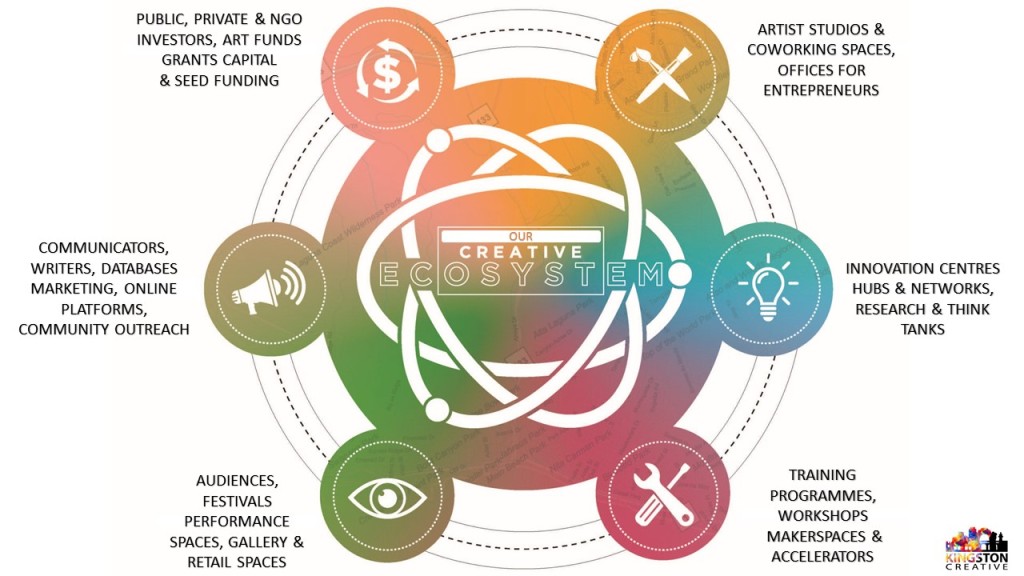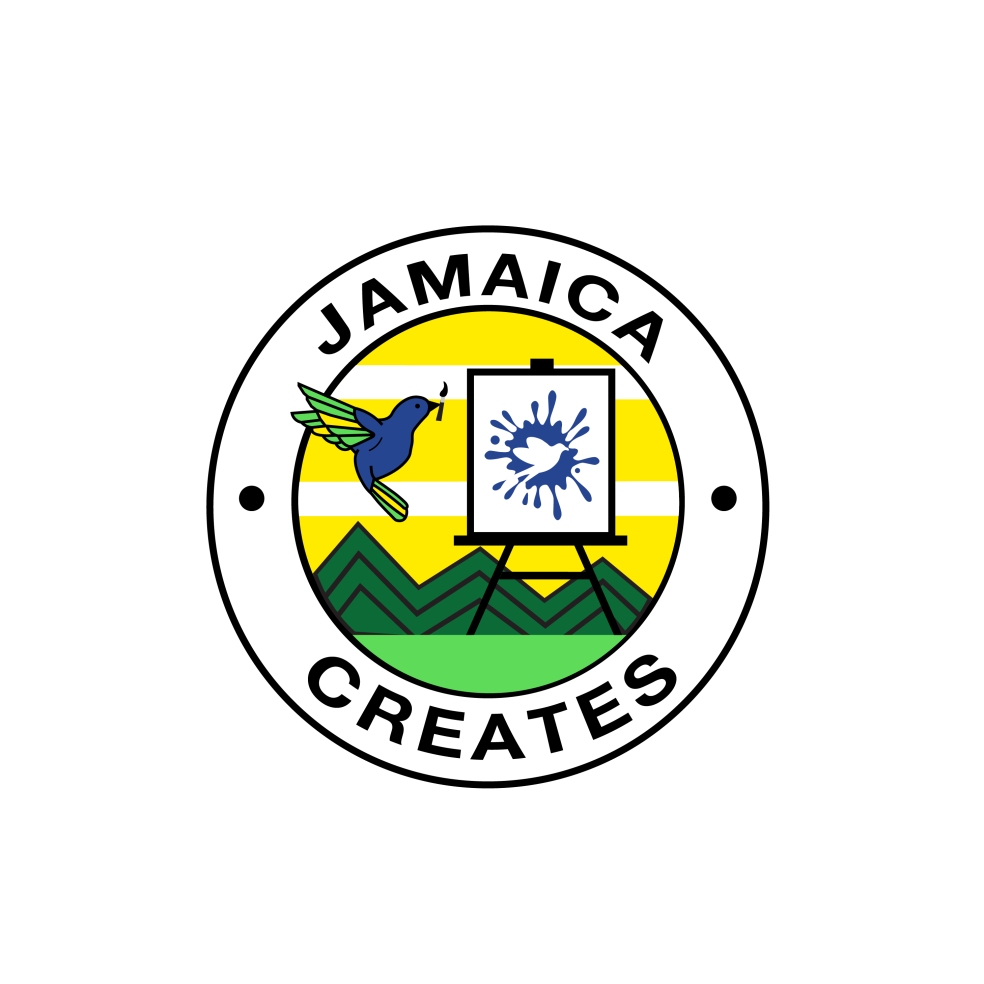Ashly Cork
October 12, 2020
The burden of the Creative Industry is to prove that it is more than fun and entertainment but legitimate and profitable just as much as any other industry. In Jamaica, young and old creatives alike have taken on the battle of pushing the narrative that work done in this field can be a legitimate career. These practitioners can be formally trained and educated, start reputable and successful creative businesses and make tons of money with the additional benefit of doing something they are passionate about. So how do we, within the industry, continue to push towards legitimising the way we work and the spaces we operate/occupy? The head of the Blank Canvas Ja Podcast, Ewan Campbell, sat with the founder of Kingston Creative, Andrea Dempster-Chung to discuss key points to the legitimisation of the creative industry and Jamaica Creates was there to report on it all.
Six Factors for Developing the Creative Industry:
Before considering businesses and single person entities, it is key to understand the Industry as it stands and the ecosystem in place that allows it to run as it does. We must account for the gaps that currently exist in the industry before we start creating a roadmap to formalisation. Kingston Creative, in their own research, has developed six key factors making up Jamaica’s Creative Ecosystem and thus stand as core areas for development:

- Funding– public and private sector funds, including venture capital funds, and financial institutions who understand the creative ecosystem.
- Space– affordable spaces to create, practice and perform.
- Training and Development– legitimate means of certification and training within various fields.
- Messengers of the Brand/ Communicators– ways to know what is happening in the industry and how to procure the goods and services of those within.
- Innovation Houses/ Think Tanks– spaces where like-minded people can get together and network and bounce ideas for the development of the industry (such as the Kingston Creative Hub).
- Audiences- The transaction from artist to the audience included in spaces such as festivals, galleries and retail spaces.
She stated that it is crucial for Jamaica as a country to view creativity as an asset, as something that people can (and should) invest in. We need to make the link between actual raw talent and national development. There needs to be a level of collaboration across all sectors that the Creative Industry interacts with(culture, entertainment, tourism, foreign affairs, economic growth, commerce, etc.) for the industry to be able to fully thrive. So while we seek to create our own table, it is indeed crucial to have a seat at the tables that already exist.
“We are all creative,” Andrea believes. In Jamaica especially, many (if not most) creatives have a day job. They are turned away from a creative career and have it as a ‘side hustle’ or a hobby. In taking the step of capitalising on our talents it is crucial to respect your craft as a business in itself. Once you do that, you move on to educating people on the worth of your craft and the cost of providing your service/business, as any other industry would. This is crucial in moving away from the ‘friend ting’ culture that exists in Jamaica’s Creative Industry.
Creative Entrepreneur and Freelancer- What’s the difference?
Understanding the development of the industry individuals themselves, Ewan posed the interesting question of “what is the key difference between a creative entrepreneur and a freelancer within the creative space?” Andrea simply made the distinction between the two by highlighting, “many persons calling themselves an entrepreneur have not created a business, they have just created a job for themselves and it’s a big distinction.”
More specifically, freelancers have a job or series of jobs with several different employers where one minute of their time equals a unit of compensation- they are selling their time while entrepreneurs create an actual business entity. Notably, this business must be able to operate on its own once you step away. An entrepreneur, in whatever field, is able to set up employment for themselves and others and create something that has a level of succession past their involvement in it and while there are benefits to freelancing, creating this solid entity should truly be the end goal for creative practitioners.
How To Formalize Your Creative Business
“Nobody is confused about the power of Jamaican culture,” Andrea underlines. The question though is, how are Jamaican creatives able to cross that threshold and begin the process of starting a business, running their start-up and eventually having an entity capable of running by itself?
Andrea outlined what she had identified as the critical first steps:
Step 1: Make a business plan. Take the time to write down your goals and expectations of your business. Use this as your reference point throughout the execution of the business to ensure you are continuing along the right path.
Step 2: Make sure you have protected the company and the ideas you have developed. A key step is registering your Intellectual Property. In Jamaica, this can be done at the Jamaica Intellectual Property Office (JIPO).
Step 3: Register your company legally- in Jamaica. This is done at the Company’s Office of Jamaica. She also suggested a starting point is registering as a sole trader and moving to a limited liability company as the business progresses.
Step 4: Develop an organizational structure. Teamwork is important, ensure your company runs efficiently with all responsibilities adequately delegated with the right team to get the job done.
Staying Motivated
It’s easy to get overwhelmed by the process and just as easy to be demotivated trying to thrive in an industry where you feel you may not be reaching your full potential and gaining the traction, and even monetary value that you deserve. “People want to live meaningful lives,” Andrea shares, “there will be tough days but life becomes so much more meaningful if you feel like you’re living on purpose… Let your passion guide you. Do the things that lift your spirit. Find like minded people and… expand your circle.”
With the creativity and passion that lie within the spirit of Jamaica’s people, the formalisation of the industry is not just a dream but is currently underway, having made incredible strides in the last five years. What we must do is “invest in the thing we already know we are excellent at,” as Andrea stated. With the impact of COVID-19 on the sector and country on a whole, the creativity of our workers, and by extension population, must now be moulded and mended to fit a new time, working to regain the momentum of the industry before the pandemic. Let us not miss our opportunity to contribute to the rebuilding of our economy in the post-COVID era. With collaboration and a mutual goal for success in mind it is certainly possible.

You can listen to the full discussion between Ewan and Andrea on BlankCanvas Ja’s Podcast here: https://youtu.be/rp2kMpJIByM
How to get involved:
Want to get involved in Jamaica’s creative industry and don’t know where to start? Visit www.kingstoncreative.org and sign up to be a volunteer, you will be placed in a particular group specific to your skills and interests!


